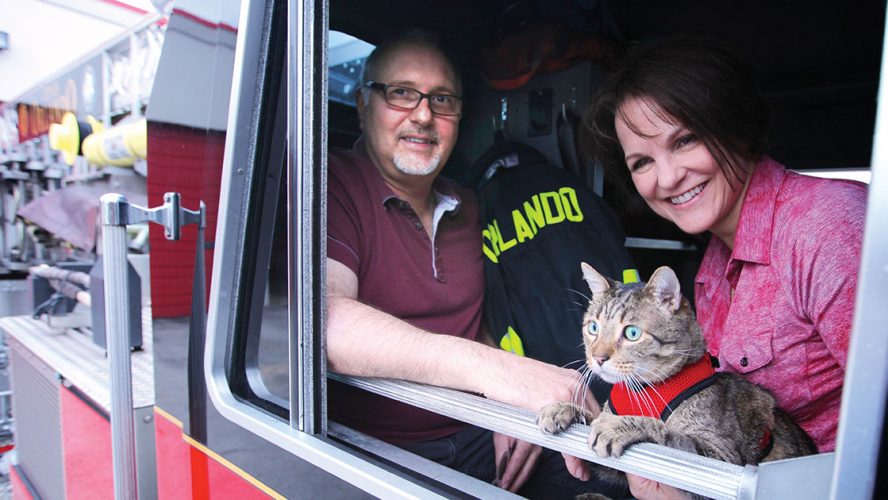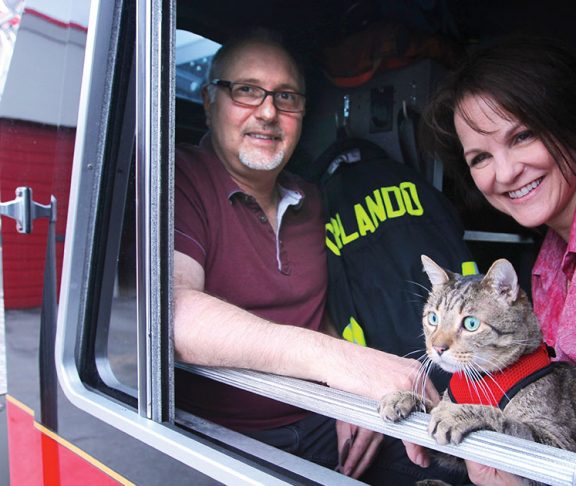For Jennifer Chap and her cat, Buddy, it was a typical morning in the home office on a marathon conference call. Suddenly, Buddy started meowing, jumping and scratching frantically. Something was wrong. Together they headed to the kitchen, where she discovered husband Rick Chap on the floor — unresponsive, gasping for air and appearing to have a seizure.
Jennifer called 911. Rick, 56, was suffering sudden cardiac arrest (SCA). His heart was not beating. He was clinically dead. “I’m losing him,” she pleaded. To her horror, Rick took a final agonizing breath in her arms.
She knew he needed CPR. Fortunately, the dispatcher calmly coached her in hands-only CPR, urging her to press hard and fast on the center of his chest. She continued compressions to the beat of the Bee Gee’s “Stayin’ Alive.” Jennifer was Rick’s heartbeat until help arrived.
EMS was there within minutes, taking over CPR [1] and using a defibrillator to restart Rick’s heart. Jennifer was praying silently when she heard, “We’ve got a heartbeat!” EMS transported Rick to the hospital, where he underwent therapeutic hypothermia to preserve brain function. After 11 days of intensive care, Rick went home without heart or brain damage.
The Chaps would later learn that SCA affects nearly 1,000 people of all ages outside hospitals every day in the United States, and that today, only 1 in 10 survives. However, survival rates can triple when victims receive immediate CPR.[1] Undoubtedly, Buddy’s persistence, Jennifer’s quick actions and prompt use of the defibrillator made the difference between life and death.
SCA survival depends on people nearby who call 911, start CPR and use an AED (automated external defibrillator) immediately. AEDs are lifesaving devices, easy for anyone to use, and increasingly available in airports, businesses and schools.
SCA is not a heart attack. When a person has a heart attack, they are awake, the heart is beating and they can communicate. When a person has SCA, they are not awake, the heart is not beating and they cannot communicate. A heart attack can lead to SCA, but there are many other causes.
Since 7 in 10 SCAs occur at home, it’s important to learn CPR and AED skills to protect loved ones. Keeping an AED at home or in the car cannot hurt.
September 29 is World Heart Day, and October is National Sudden Cardiac Arrest Awareness Month — a great time to prepare and remember these 3 steps:
1. Call
Call 911 and follow dispatcher instructions.
2. Push
Press hard and fast on the center of the chest at a rate of 100-120 beats per minute.
3. Shock
Use the nearest AED as soon as possible.
Rick’s survival started with one amazing cat whose alert enabled his wife to give immediate CPR. “We are all born with CPR tools right here in our own hands,” said Rick. “I am living proof that CPR works.”
[1]American Heart Association Heart Disease and Stroke Statistics – 2018 Update, published online in Circulation, Jan. 31, 2018. See summary report on AHA statistics here.

